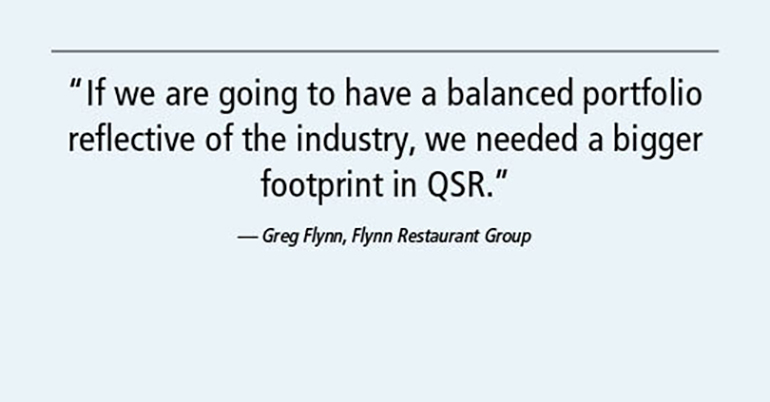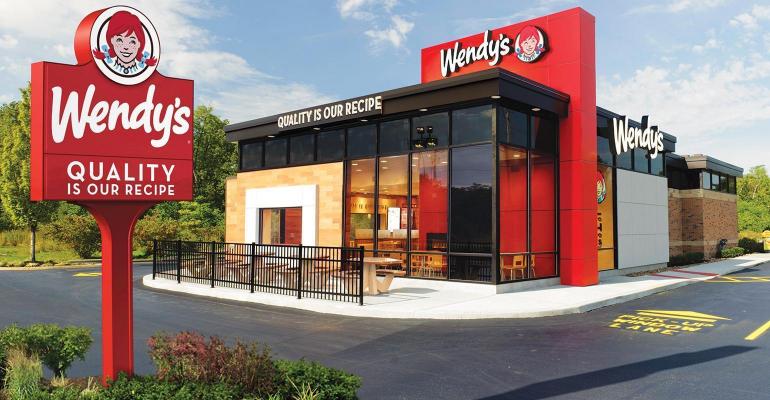Restaurant franchise groups are getting bigger and diversifying their portfolios, reflecting the significant number of aging franchisees and a new era of sophisticated buyers who apply their scale to deal with increasingly complex rules and operations.
“Multi-unit ‘zees that are OK on debt want to hedge their bets or see openings their home brand just can't address,” said John Gordon, principal at Pacific Management Consulting Group and an adviser to franchisee organizations.
As smaller-scale franchisees age out of older restaurant brands and throw down the gauntlet, the larger companies are there to pick it up.
For example, Meritage Hospitality Group Inc. of Grand Rapids, Mich., in October acquired five more Wendy’s restaurants in the Atlanta market, adding about $8.8 million in annual sales to the company. That move came just a month after Meritage bought five Wendy’s in the Midland-Odessa, Texas, market in September that added $9.1 million in sales.
“We intend to immediately integrate each of the acquired Wendy’s into our operating and accounting platform and fold them into our Wendy’s remodeling program that is designed to enhance the overall guest experience,” Robert Schermer Jr., Meritage’s CEO, said in a statement at the time.
In addition to Wendy’s, Meritage Hospitality crosses segments and brands with Freighters, Stan Diego Baja Taco Kitchen, Twisted Rooster and Wheelhouse Kitchen & Cocktails in 16 states.
As a result, Meritage has quite a few restaurants in aggregate —332 restaurants, and plans by 2025, to have 435 units.
Meritage is not alone.
The holdings of Dallas-based Sun Holdings Inc., founded in 1997 with one Golden Corral unit, in July passed the 1,000-unit mark with the opening of a Popeyes Chicken and Biscuit restaurant.
Owner Guillermo Perales, who opened that first Golden Corral with a Small Business Administration loan, has developed a portfolio of brands in 12 states.
The company has more than 290 Burger Kings, 150 Popeyes, 90 Arby's, 20 Golden Corrals, 30 Cicis Pizza and a dozen and a half Krispy Kreme units. It also operates 160 T-Mobile and 80 GNC locations. In January, Sun Holdings completed its purchase of Taco Bueno Restaurants LP, which had filed for bankruptcy restructuring in November, and brought 148 Taco Bueno units into the fold.

“In our 22-year history, we have partnered with world-class brands and have significantly grown our company, as well as the presence of these highly-recognized organizations," said Perales, with the opening of Sun Holding’s landmark Popeye’s in July.
“Opening our 1,000th location is such an exciting and momentous occasion,” Perales said in a statement.
Perales has been honored with a number of awards, including the Nation’s Restaurant News Golden Chain honor in 2016 as well as the Power List. He was named Ernst and Young's Entrepreneur of the Year in 2008, as well as Latino Leaders Magazine's 101 Most Influential Latinos for several consecutive years.
While most multi-concept restaurant franchise groups remain private, Meritage in Michigan is an exception, providing a glimpse into the performance of these large companies.
Traded over the counter as $MHGU, Meritage Hospitality releases earnings guidance.
For the first three quarters of 2019, Meritage reported growth in earnings before interest, taxes, depreciation and amortization of 18.7%
Meritage’s guidance for the full year included sales and net earnings growth of positive 10% to 20%.
For 2020, the company said, “We are forecasting accelerating sales and earnings growth in 2020, driven by 2019 newly developed, reimaged and acquired restaurant coming fully on-line, as well as the nationwide roll-out of breakfast across our Wendy’s markets in the first quarter of 2020.”
The giant among restaurant franchise operators remains the San Francisco-based Flynn Restaurant Group LP, which expanded its portfolio last December with the affiliated RB American Group LLC’s acquisition of 368 Arby’s from U.S. Beef Corp. of Tulsa, Okla.
That transaction cemented the Flynn Restaurant Group’s spot as a Top 20 U.S. foodservice company, elevating its systemwide sales to $2.3 billion and its unit total at the end of 2018 to 1,245 restaurants in 33 states. It operates such brands as the casual-dining Applebee’s Neighborhood Grill & Bar and quick-service Taco Bell.
Found by Greg Flynn in 1999, the restaurant group has grown into the nation’s largest franchise restaurant operator and employs about 50,000 people. Other acquisitions included the July 2017 Pan American Group purchase of 34 fast-casual Panera Bread locations in Kansas and Missouri from Wichita, Kan.-based Original Bread Inc.
The Arby’s purchase last December was the Flynn Restaurant Group’s fourth prominent brand.
Flynn, the CEO of Flynn Restaurant Group, was the first franchisee to receive Nation’s Restaurant News’ Operator of the Year in 2016. “I guess operations matter. We live it, breathe it, eat it and drink it every day,” Flynn said in accepting the award.
“It recognizes that franchisees are getting a little credit for running restaurants day in and day out,” Flynn said during his speech, when he noted that both he and Sun Holdings CEO, a fellow franchisee, was also a Golden Chain award winner.
“Simply running great restaurants day in and day out is more important than marketing, more important than menu. All of those things are important, but the one thing that stands out in the pack is just execute well.”

With the Arby’s acquisition, Flynn’s group spans several restaurant industry segments, including the lucrative quick-service business.
“QSR is the largest segment in the industry,” he said in an interview after that deal. “If we are going to have a balanced portfolio reflective of the industry, we needed a bigger footprint in QSR. QSR has the best unit economics in the industry.”
He said Arby's broadens the company's portfolio, similar to Taco Bell and Panera in the Flynn Restaurant Group's holdings.
“It’s sort of a ‘category of one.’ It’s a highly differentiated player,” he said.
“There’s no one else who does exactly what it does. It doesn’t compete head-to-head on price. You compete with everyone, in a way, from McDonald’s and Wendy’s and Burger King. But if you want those hot meat sandwiches, there is only one place you are going to get them.”
Operating large franchise restaurant organizations take a special consideration of culture, Flynn noted.
He said the linchpin of his company’s restaurants is trust.
“We trust our operators and try to empower them and challenge them,” he said. “But we don’t micro-manage. I think of it as a fairly decentralized state-and-federal structure. … We like to treat individual [brand] presidents in their markets as independent franchisees. They have real authority to run their restaurants with considerable latitude. They have hire-fire [authority]; they have the ability to adopt different operating policies; they can make cap-ex decisions.
“We support them and try to align our interests through profit sharing and through equity ownership. And we trust them,” he said. “We share best practices across our markets as our main way for our independent operators to do it better. We make sure our operators are competitive with each other by nature, but in a healthy way.”
Contact Ron Ruggless at [email protected]
Follow him on Twitter: @RonRuggless

